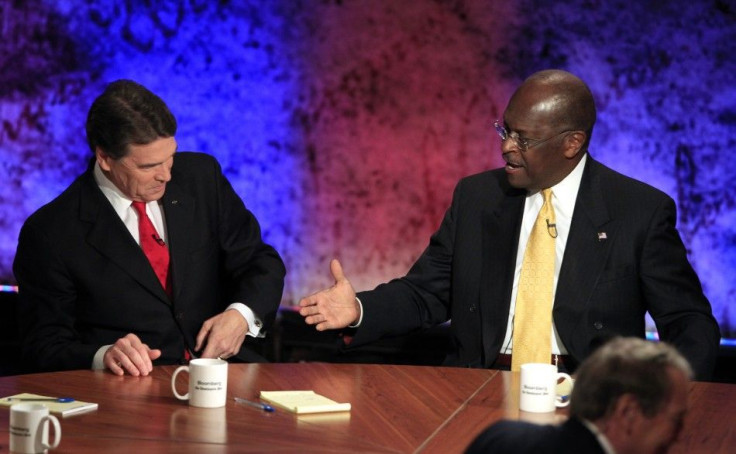Herman Cain Essentially Ties Rick Perry in Texas, Perry's Home State: Poll

Rick Perry will have to fight to win the Republican primary in his home state, according to a new poll.
A University of Texas-Texas Tribune poll found that 27 percent of self-identified Republicans would vote for Herman Cain if the primary were held today, while 26 percent would vote for Perry -- a statistical tie. The margin of error was plus or minus 4.93 percent.
Behind Cain and Perry, Ron Paul had the support of 12 percent of Texas Republicans, Mitt Romney had 9 percent and Newt Gingrich had 8 percent. The other four candidates named in the poll -- Michele Bachmann, Jon Huntsman, Gary Johnson and Rick Santorum -- got 2 percent or less apiece, and 11 percent of voters said they were still undecided.
Cain is doing especially well among the conservative voters to whom Perry's campaign has tried to cater. The Georgia businessman leads 37 percent to 24 percent in that category. Perry wins every other ideological group, but the conservative demographic is key in Texas.
For Gov. Perry, the news is mixed, Daron Shaw, the co-director of the poll and a government professor at the University of Texas, told The Texas Tribune. The current numbers represent a substantial improvement over his showing in our last poll. On the other hand, he is not dominating here they way one might have expected.
The last poll was conducted in May, when Perry was still insisting that he had no plans to run for president, so it is unsurprising that his support has risen since then. But the numbers are far from promising for a candidate who has based his platform largely on his accomplishments as governor, because they indicate that the very voters he has served as governor are not convinced that his record qualifies him to be president.
In fact, Perry's ratings as governor are quite low. In the University of Texas-Texas Tribune poll, his approval rating was 39 percent and his disapproval rating was 44 percent. His economic policies got better reviews, with 42 percent of Texans saying Perry had handled the state's economy well and 41 percent saying he had handled it poorly.
The governor has made prosperity and his success in Texas a centerpiece of the campaign for the presidency, Jim Henson, also a poll co-director and a government professor at the University of Texas, said. It's going to be very hard not to look at this and assess those claims somewhat, and at the very least see what his own constituents -- and they are his constituents, since he's still in the seat of governor -- think about his performance.
Plenty of Time For Race to Change
There is plenty of time for the race to change, though. Cain is riding high on a series of strong debate performances, with top poll numbers across the country, but given his lack of political experience, the reported disorganization of his campaign and his well-publicized reversals on some issues, it is hard to say whether he can hold his lead through the primary season.
If Cain's star begins to fade nationally, Perry will have a good chance of retaking the race in Texas, although he seems unlikely to regain his popularity elsewhere.
Perry entered the race in August to much fanfare and immediately shot to the top of the polls. He cast himself as an unwavering conservative with a proven governing record, and it worked, earning him the support of the Tea Party and of fiscal and social conservatives alike.
But he crashed in late September after a poor showing at a GOP debate in Orlando, Fla., where he stood by a previous position that the children of illegal immigrants should be eligible for in-state tuition in Texas and told his opponents that if they didn't agree, he didn't think they had a heart.
If conservative voters have shown anything this election cycle, it is that they are looking for ideological purity and will not hesitate to drop a candidate they previously championed if he or she doesn't toe the conservative line -- and that is exactly what happened with Rick Perry. The latest CBS News-New York Times poll showed him in fifth place, with the support of 6 percent of likely Republican voters nationwide.
One thing seems certain from the Texas poll, though: whoever the Republican nominee is, he or she will win the Lone Star State in the general election. The top four finishers in the poll -- Cain, Perry, Paul and Romney -- all beat President Obama among Texas voters in hypothetical matchups.
Interestingly, Perry actually does better than Cain against Obama, probably because Cain's support is strongest among conservative voters and not as strong among the independent voters who decide general elections.
Perry beat Obama 45 percent to 37 percent among Texas voters, while Cain beat Obama 40 percent to 35 percent. Paul won 38-33 and Romney won 36-34, with a margin of error of plus or minus 3.46 percentage points. Texas has not gone Democratic in a presidential election since 1976, when it voted for Jimmy Carter over Gerald Ford.
© Copyright IBTimes 2025. All rights reserved.




















